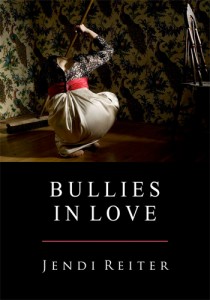The cover of Paul Fericano’s poetry collection The Hollywood Catechism (Silver Birch Press, 2015) shows a smoldering black-and-white movie still of Burt Lancaster as con-artist preacher Elmer Gantry, with his bedroom eyes and well-thumped Bible. This characteristically American blend of flim-flam, movie idols, and popular Christianity sets the tone of this entertaining and original book.
Many of these poems would be considered light verse, like the opening number, “The Actor’s Creed”:
…I believe in the Holy Spielberg,
the holy casting couch,
the communion of press agents,
the forgiveness of Sally Field,
the resurrection of my career,
and life everlasting without Tom Hanks.
Amen.
The real joke is how easily these wisecracks fall into the rhythm of familiar prayers that we repeat without much thought. We might as well be praying to Spielberg–he’s got more money than God, as they say. Like the characters in our childhood Bible stories, celebrities occupy a realm between reality and fantasy. Even when we lose faith in them, they retain some of their glamour, their power to make us nostalgic for the simple joys of worship.
This poignancy gives heft to the book’s most memorable poems, such as the tour de force “Howl of Lon Chaney, Jr.”, a take-off on Allen Ginsberg’s “Howl” in honor of B-movie horror actor Larry Talbot, “the Wolf Man”. Fericano writes compassionately of the dark side of the Hollywood dream, the loneliness of addiction and lost popularity. Substituting “Universal Studios” for “Moloch” in Ginsberg’s version, the meaning is still the same:
Universal the slaughterhouse of essence! Universal the
flesh-grinding boneless junkyard and studio of
terror! Universal whose films are USDA graded!
Universal the meat cleaver of inspection! Universal
the concrete productions!Universal whose checkbook is bottom line! Universal whose
life is zombie profit! Universal whose thoughts
are small implosions! Universal whose head is a cannabis
fire pit! Universal whose heart is a ticking bomb!
The nyuk-nyuk’s don’t stop with his author bio: “Since 1971 his poetry and prose have appeared, disappeared, and reappeared in various underground and above-ground literary and media outlets… Loading the Revolver with Real Bullets (Second Coming Press, 1977), a collection of his work partly funded by the state of California, achieved notoriety in 1978, when one of its poems, ‘The Three Stooges at a Hollywood Party’, was read on the floor of the California State Senate as a reason to abolish the California Arts Council.”
On a more serious note, Paul is also the director of Instruments of Peace/SafeNet, a nonprofit reconciliation group for survivors of clergy sexual abuse. Visit his blog, A Room with a Pew, to learn about his latest efforts to help victims obtain restitution from the Catholic Church.
Enjoy the poems below, which he has kindly given me permission to reprint.
The Three Stooges Meet Charles Bukowski In Heaven
The day is like any other day in Paradise
where angels hang out on street corners in between gigs
smoking filtered cigarettes drinking ginger ale
and swapping stories about the Son of Man.
Everyone has an eye fixed on Jesus.
He’s on his knees in an alley shooting dice
with the Three Stooges
and the poor bastards are losing their shirts.
The Savior of the World is on fire.
In flowing red robe he rattles the bones in his hand
brings them to his ear shakes them like the Second Coming
and blows on them once for luck.
He arcs his fist before release and shouts:
Baby needs a new pair of shoes!
then tosses them with the same force his father summoned
to create the Milky Way.
When he flashes that wide resurrection smile
the one he showed the Romans right before they nailed him,
he scoops up his winnings with a wink and a nod
and everyone knows the Lamb of God is on a roll.
The Stooges are victims of divine intervention.
They make the sign of the cross and Jesus smiles.
I like you guys, he says, slapping their faces affectionately.
And just like that three morons become saints.
Leaning against a wall drinking beer from a bottle
always cold never empty is Charles Bukowski.
He shifts his weight like a man itching to start something
eyeing the action as if he’s writing his last poem.
Jesus stands now and introduces them.
The Stooges pull back unsure of what to expect from a guy
who once threw up on Norman Mailer and just last week
tried to look up the Virgin Mary’s dress.
Bukowski hesitates, too. He remembers almost losing an eye
in a pie fight and watches their fingers closely now
the air so choked with mistrust even the Holy Ghost is scared.
That’s when Jesus stands on his head.
It’s a minor miracle, not like changing a Beatles’ song
into a jingle for running shoes, but it breaks the tension at last.
Sighs of relief rise up like hosannas and everyone laughs,
especially the Son of God who isn’t wearing underpants.
****
Sinatra, Sinatra
Sexual reference:
A protruding sinatra
is often laughed at by serious women.
Medical procedure:
A malignant sinatra
must be cut out by a skilled surgeon.
Violent persuasion:
A sawed-off sinatra
is a dangerous weapon at close range.
Congressional question:
Do you deny the charge of ever being
involved in organized sinatra?
Prepared statement:
Kiss my sinatra.
Blow it out your sinatra.
Financial question:
Will supply-side sinatra halt inflation?
Empty expression:
The sinatra stops here.
The sinatra is quicker than the eye.
Strategic question:
Do you think it’s possible to win
a limited nuclear sinatra?
Stupid assertion:
Eat sinatra.
Hail Mary full of sinatra.
Serious reflection:
Sinatra this, sinatra that.
Sinatra do, sinatra don’t.
Sinatra come, sinatra go.
There’s no sinatra like show sinatra.
Historical question:
Is the poet who wrote this poem still alive?
Biblical fact:
Man does not live by sinatra alone.



